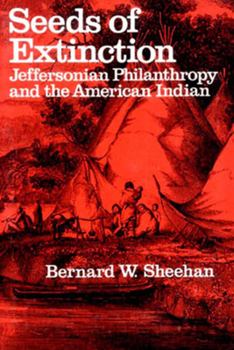Seeds of Extinction: Jeffersonian Philanthropy and the American Indian
Select Format
Select Condition 
Book Overview
Seeds of Extinction opens a broader perspective on the history of Indian-white relations by exploring first what the Jeffersonian's premises were and then how they became translated into governmental policy.
Format:Paperback
Language:English
ISBN:0393007162
ISBN13:9780393007169
Release Date:January 1974
Publisher:W. W. Norton & Company
Length:301 Pages
Weight:0.65 lbs.
Dimensions:0.8" x 4.9" x 8.0"
Customer Reviews
1 rating
Excellent intellectual history!
Published by Thriftbooks.com User , 15 years ago
This book's argument is too frequently misunderstood, particularly given how well it is written. Sheehan argues that the Indian Policy of the Early Republic was fundamentally flawed b/c those who argued for assimilation fundamentally failed to: 1.) understand American Indian cultures and 2.) underestimated the ferocity and speed w/ which the Anglo-American frontier would expand. Removal was the result of this failed policy which was constructed not by "Indian haters" but by those who actually thought Indians would be incorporated within the republic. The lesson here is one that is often illustrated in American Indian history: "W/ friends like these, who needs enemies?" The well-intentioned philanthropists of the eastern establishment were as much a threat to Indians as were the Indian-hating frontiersmen. This is not and was not intended to be Native American history. It is an intellectual history of how policy makers and informers in the Early Republic perceived Indians and then acted upon those perceptions. Unlike many subsequent scholars who studied the image of the Indian in American culture, Sheehan never claimed to actually study Indians.






